
For my post on the Arab youth views of democracy, click here.

For my post on the Arab youth views of democracy, click here.
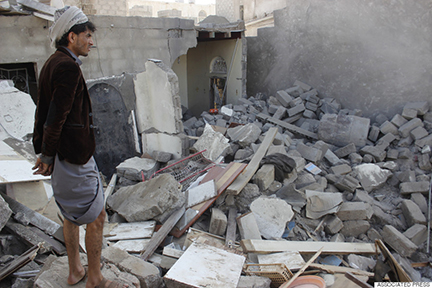
Saudi Arabia has announced that their Decisive Storm bombing campaign is over and they have accomplished their apparent goal of destroying any military capacity of Yemen. There is an old proverb in Arabic that states “ba’d kharab Basra” (after the destruction of Basra) and it is quite apt as a follow up to this news. The weapons destroyed can be replaced, and no doubt at some future date will be, but the lives lost and the mortal wounds to Yemen’s pride can never be restored even by a so-called “Restoration of Hope.” The Saudi offer to pay millions to rebuild Yemen pales in terms of what I assume must be measured by at least a billion or more in terms of the bombs dropped and resupplied. If instead of attacking Yemen from the air, the same amount of money had been given to build health clinics and schools, what a different outcome there would be. Instead, the stench of war is not about to be overcome by any monetary perfuming from abroad.
The damage inflicted by this ill-conceived war campaign is obvious. Forget the nonsense about an Iranian threat, which there never was. The Huthis never controlled anything; it was Salih’s former military supporters who were behind the takeover of Sanaa and the push to Aden. Try to remember the real threat inside Yemen, the one that energized the U.S. drone campaign: al-Qaida, known as Ansar Sharia, has more power and more sympathy now that at any other time. The south is basically in their control. There is little chance that they would welcome Hadi back. So the result of this bombing is a totally destabilized Yemen, a security nightmare, a humanitarian crisis that is not likely to be alleviated soon. Continue reading Ba’d kharab Sanaa
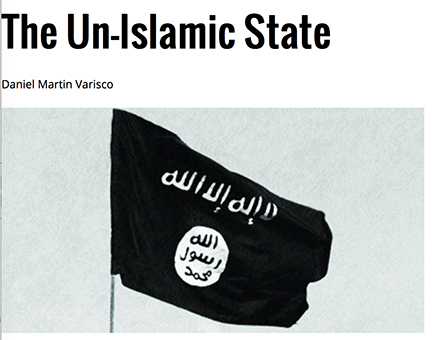
How Islamic is the Islamic State known as ISIS, ISIL, IS, Daesh and the new caliphate? To the extent that any group claims to be Islamic, quotes Quran and brandishes the rhetoric of the faith, ISIS is clearly presenting itself as an Islamic sect. To the extent that they have bastardized just about every other Islamic worldview, they are certainly not in the mainstream. Their appeal is not to Muslims who know the history of their faith, but to the disgruntled youth of the West and traumatized youth of the region. And, most importantly, ISIS is, ironically, the revenge of Saddam Hussein. This calculating and blood curdling group was formed not by madrasa-trained clerics but by former intelligence and military cronies of Saddam’s regime.
For the rest of this essay, click here.
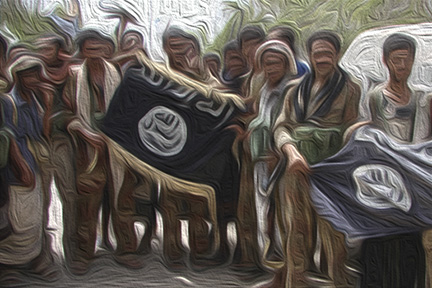
There is a sense in which all wars are stupid wars. But some are more stupid than others. Invading Iraq, which posed no tangible danger to the United States but filled the brainless crania of a group of neocons, is a prime example. Can you imagine Iraq as an ally of Iran or as a breeding ground for extreme ISIS terrorists if Saddam or one of his cronies was still in command? This is not to praise a butcher like Saddam, but to point out that the unintended, even if quite predictable, outcomes of hastily made warmongering tend to take on lives, as they take out lives, on their own. So here is the current scorecard for Decisive Storm, as it nears a month of nightly bombing. Instead of weakening the unholy alliance between the Huthis and Ali Abdullah Salih, this group controls more territory than it did when the bombing started. The major shock from the “shock and awe” campaign thus far is that it is destroying Yemen’s infrastructure and formal military structure, but steadily gaining allies who resent the vast destruction being unleashed on their homeland. Many of those Yemenis who did not like the Huthis now hate the Saudis even more. In addition to the homeless and the dead, the pride of Yemeni nationalism has been seriously wounded, but it is nowhere near dying.
Once upon a time the enemy in Yemen was al-Qaida, the group that sparked our unending and unnerving “War on Terrorism.” It was self-styled as a war against the uncivilized, since in this case only the civilized could muster drones and sophisticated bomber planes. Under Obama’s watch a few al-Qaida operatives were eliminated, along with a larger number of civilians who get classified as collateral damage. The American people are still being told that al-Qaida is our main enemy. Remember the Alamo; remember 9/11. But no longer, it seems. Continue reading Is the enemy of our enemy still an enemy?

Since the start of the Saudi-led Decisive Storm campaign in Yemen, I have published two commentaries on the blog of the Center for Middle East Studies at Lund University and three interviews on The Real News. While the situation is changing daily, seemingly for the worse each day, I note these commentaries here:
Lund Blog:
Proxy Morons: The Demolition of Yemen (http://www.menatidningen.se/english/proxy-morons-the-demolition-of-yemen) March 27
Sliding Towards a Virtual Genocide in Yemen (http://www.menatidningen.se/english/sliding-towards-a-virtual-genocide-in-yemen) April 13
The Real News:
Proxy Morons: The Demolition of Yemen (3/1)
http://therealnews.com/t2/index.php?option=com_content&task=view&id=31&Itemid=74&jumival=13565 April 4
Proxy Morons: The Demolition of Yemen (3/2)
http://therealnews.com/t2/index.php?option=com_content&task=view&id=31&Itemid=74&jumival=13636 April 12
Proxy Morons: The Demolition of Yemen (3/3)
http://therealnews.com/t2/index.php?option=com_content&task=view&id=31&Itemid=74&jumival=13639 April 13
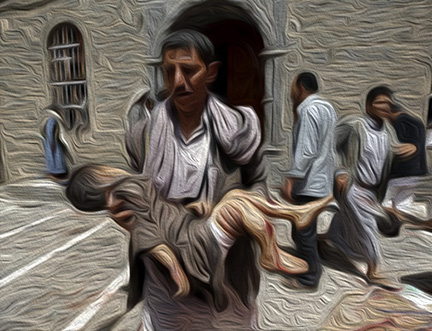
Do bodies count or do we just count bodies? The tally of victims over the past week continues at a fierce pace. The dead in Yemen are not even being counted as many corpses now are rotting where they fall. UNICEF says only 74 Yemeni children have been killed since the bombing by the Saudi Coalition began, but that is surely an understatement. Hundreds of civilians have died and numerous soldiers and militia on both sides. A few days ago Somali Shabab ruthlessly murdered almost 150 students at Garissa University in Kenya, separating the Christians out from the Muslims. Add this to the killing by Boko Haram in Nigeria. Now in Tikrit mass graves are being found that tell the story of 1700 Iraqi soldiers executed. And ISIS has now taken over most of the Yarmouk Palestinian Camp in Damascus with more dead bodies and many more to come.
We are witnessing a killing frenzy, but the daily reports might as well be a Hollywood film or a shoot-em-up video game. How many bodies must there be before the killing stops? Operation Decisive Storm in Yemen is turning out not to be decisive but divisive, creating chaos in Saudi Arabia’s poor neighbor to the south. The shock-and-awe strategy is no doubt appealing to the arms dealers worldwide; their champagne glasses must be tinkling with every bomb that is dropped. The massive arsenal raining down destruction on Yemen can easily be replaced, but not the bodies of the victims. The killing continues on the ground as well in Yemen, a political nightmare engineered by former President Ali Abdullah Salih to regain power. But what would he regain power over? A country devastated beyond the current economic collapse, a land where his unchecked gluttony left Yemen the poorest country in the region, a people pitted against each other with the encouragement of foreign powers? A pile of corpses as high as a mountain, a mountain of utter despair? Continue reading Do Bodies Count…
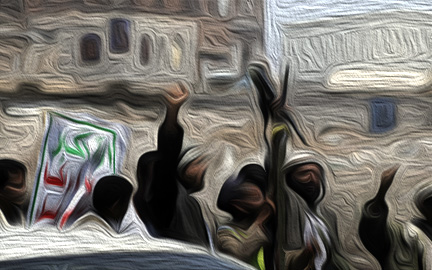
by Helen Lackner , Open Democracy, 6 April 2015
The war which has now started is what many of us feared for so long and hoped, against all rational thinking, would be avoided. And this time, let us not fool ourselves with misguided optimism, this will be long and as awful as any war can be. While political and even military internal struggles are hardly a novelty in Yemen, the new element is that the conflict has now added a major layer of international ‘proxy’ features which will only worsen the situation, making it reminiscent of the Lebanese civil war in the 1970s-80s.
Why is this the outcome of the 2011 revolutionary uprisings seeking economic development, justice and dignity, the end of kleptocracy and other good things? Who is to blame? Could it have been avoided? My earlier articles provide some of the background to understanding the current situation, and while many of these factors remain relevant today, and will remain so in the foreseeable future, the outbreak of full-scale war including foreign parties is an entirely unprecedented phenomenon which will affect Yemen’s people and the region for years to come.
While Saudi Arabian involvement in Yemeni affairs is a longstanding fact, going back to the Imamate period and the earliest days of the creation of the Kingdom, this is the first time SA has taken the initiative to launch a major international military attack, albeit by air.
International media talk constantly of Huthi forces, but in reality the main military force in Yemen is now that of ex-president Saleh who, wherever he is, is doing what he promised: destroying as much as he possibly can.
It may not be particularly useful to non-specialists of Yemen to go into the details of the sequence of events since the Huthi coup of 6 February. But a rapid recall of the main events is important. After a month under house arrest in Sana’a, the legitimate internationally recognised president escaped to Aden where he attempted to establish a temporary government. Although the southern separatists, one of whose main strongholds is Aden, gave him at least tacit support, Huthis and former president Saleh military forces increased their attacks southwards and rapidly reached Aden itself. The ‘popular committees’, ie local militias supporting him, are no match for Huthi/Saleh well trained and equipped forces. Since participating in the Arab Summit at Sharm el Sheikh, Hadi and his ministers are in Riyadh which has become their operational base.
For the rest of this article, click here.